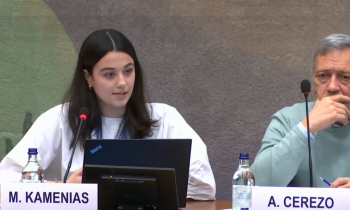Centering Migrants’ Voices in the Regional Migration Reviews

The second round of Regional Migration Reviews are set to take place throughout 2024 and 2025, starting with the United Nations Economic Commission for Europe (UNECE) region.
The Regional Reviews allows Member States and stakeholders to assess the Global Compact on Migration (GCM) implementation - focusing on regional priorities, enhancing cooperation, and monitoring progress.
The UNECE Regional Review took place in Geneva on 11 March, preceded by a Multistakeholder Hearing. While the Intergovernmental Regional Review is primarily designed for Member State engagement and contribution, the Multistakeholder Hearing provided the opportunity for civil society to give their insights on the implementation of the GCM in the region.
The Quaker United Nations Office (QUNO), as a panelist during the Multistakeholder Hearing, spoke about the importance of meaningful migrant participation in GCM implementation. To try and walk the talk, QUNO contacted several migrant advocates to ask what they would have said in panel, using their responses to form its contribution.
QUNO emphasised the call for “nothing about migrants without migrants” and to consciously turn these words into meaningful action.
For a successful and long-lasting GCM implementation, migrants’ lived experiences and expertise needs to be at the heart of discussion and action. This means including migrants in all levels of decision-making, from shaping migration policies to assessing their impact on the ground.
QUNO focused on three thematic approaches on strengthening meaningful migrant participation in the Regional Reviews:
(a) testing progress and driving change;
(b) human-rights based approach; and
(c) catalysing cooperation and engagement.
This can be done through timely information sharing in relevant languages and formats, consulting with migrants to identify key topics and speakers, and working with migrants to develop indicators to measure the impact of meaningful participatory processes.
Other civil society panelists made insightful contributions which focused on the need of strengthening rights-based pathways, addressing and improving migration narratives and ending the criminalisation of migrants.
The Intergovernmental Regional Review then provided the opportunity to Member States to share their progress and cooperation efforts relating to GCM implementation. Civil society and migrant advocates were also able to speak at this point.
While there is value in these spaces in promoting dialogue and enhancing progress in migration governance, it is important to acknowledge that these processes are still far from perfect. A conscious effort by all stakeholders must be made to further open up these spaces to further facilitate accessibility and engagement, but also transparency.
During the Regional Review, QUNO called for political will to address policies and practices that lead to the loss of migrants’ lives, encouraging everyone present to draw on their courage and compassion to continue to be moved by loss of life and human suffering to enable real change.
QUNO continues to view the GCM and its follow-up architecture as a useful tool for human rights-based migration governance and looks forward to continuing its work in collaboration with States, the United Nations, migrants, and civil society to ensure its ambitious, effective, and human rights-based implementation.


